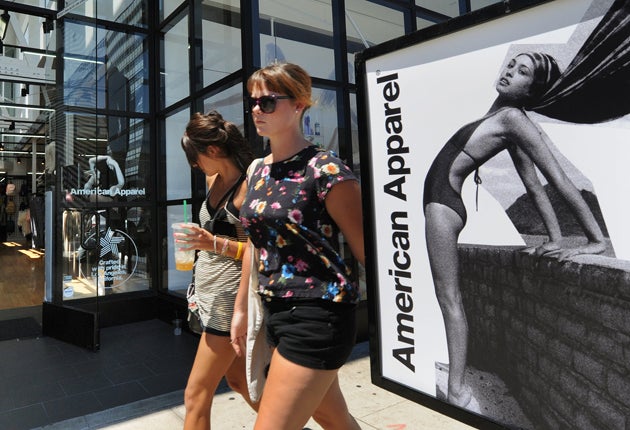American Apparel faces bankruptcy as store chain unravels
Fall of label behind the 'hipster revolution' is as mired in controversy as its founder's management style

Your support helps us to tell the story
From reproductive rights to climate change to Big Tech, The Independent is on the ground when the story is developing. Whether it's investigating the financials of Elon Musk's pro-Trump PAC or producing our latest documentary, 'The A Word', which shines a light on the American women fighting for reproductive rights, we know how important it is to parse out the facts from the messaging.
At such a critical moment in US history, we need reporters on the ground. Your donation allows us to keep sending journalists to speak to both sides of the story.
The Independent is trusted by Americans across the entire political spectrum. And unlike many other quality news outlets, we choose not to lock Americans out of our reporting and analysis with paywalls. We believe quality journalism should be available to everyone, paid for by those who can afford it.
Your support makes all the difference.He is the king of the hipsters; the eccentric fashion magnate behind a firm that turned skinny jeans and luminous Spandex into the uniform of the naughty noughties.
But now Dov Charney's fashion empire, American Apparel, appears to be on its last legs, amid growing rumours that its founder could soon be wearing his eclectic wardrobe in a court of law.
The clothing chain, known for its leggings and bright cotton T-shirts, has admitted that it is teetering on the brink of bankruptcy. It also faces investigation by the US attorney's office in New York into the reasons why its auditor, Deloitte & Touche, abruptly resigned last month.
The LA-based company's shares, which touched $14 in 2008, at the height of the so-called "hipster revolution", were trading at an all-time low of 75 cents at close of play on Friday, a drop of almost 50 per cent over the past week. It now has debts totalling $120m, and has admitted that it is currently losing money at a rate of nearly $30m a year.
Unless sales in American Apparel's 279 worldwide stores suddenly improve (and at present they are down 16 per cent on last year), the firm will breach the terms of an $80m loan provided by the British company Lion Capital in March 2009 to rescue it from another financial crisis. That would force it into receivership, threatening the jobs of 10,000 employees in 20 countries.
In the UK, 15 stores would close, providing a chaotic final chapter in the story of a bombastic figure whose unconventional management style, forward-thinking business model and self-confessed sex obsession have become the stuff of fashion-industry legend.
A fixture in the gossip columns as much as in business pages, the 41-year-old Canadian founded American Apparel in 2003, making and selling cotton basics to teenage shoppers at two LA stores.
He soon became famed for a character that was as sexy as his skimpiest garments. In interviews, he admitted to a string of affairs with young employees, and sharing offensive office banter with male and female staffers. Attractive women he met would be paid to participate in wet T-shirt competitions in the company's offices.
At least three female staff have filed sexual harassment lawsuits against him, with all the cases settled before reaching trial. One would-be plaintiff's legal complaint said he removes his trousers before business meetings and chairs them in his underpants.
Mr Charney relishes the reputation his track record brings. He once jollified an interview with Claudine Ko, a reporter for Jane magazine, by undoing his belt and fondling his crotch while discussing American Apparel's finances. The liberal attitude he brings to the office extends to American Apparel's advertisements, which have been repeatedly criticised by regulators.
Mr Charney's defenders point out that he is progressive with regard to his workforce, paying factory workers up to $20 an hour, well above minimum wage, and describing his clothes as "sweatshop free". He also gives staff health insurance and paid holidays.
The un-globalised structure of American Apparel also helped it react to the market far more quickly than its big rivals. Designs scrawled on napkins over lunch could be in shops within weeks.
Yet as the company grew, its ability to respond to the market was diluted. Earlier this month, Mr Charney declared the hipster trend, which powered his expansion, "over". He now wants to cater to older customers, who might prefer chinos to neon bike shorts.
That change, however, may come too late. The breakneck speed of American Apparel's expansion – 150 stores in its first three years, and nearly twice that in the ensuing three – saddled the firm with debts, the scale which is only now coming to light.
The company also faces production problems after a raid on its factory last year by police revealed that 1,500 illegal immigrants were working there. They all had to be fired.
Deloitte & Touche quit as American Apparel's auditors earlier this summer, after allegedly finding "material weaknesses" in the firm's financial controls. This week, in the announcement that precipitated its latest share slide, Mr Charney admitted the company is facing expulsion from New York's Amex stock exchange because the new auditors would not be able to file official second-quarter results to meet Amex's deadline.
Join our commenting forum
Join thought-provoking conversations, follow other Independent readers and see their replies
38Comments